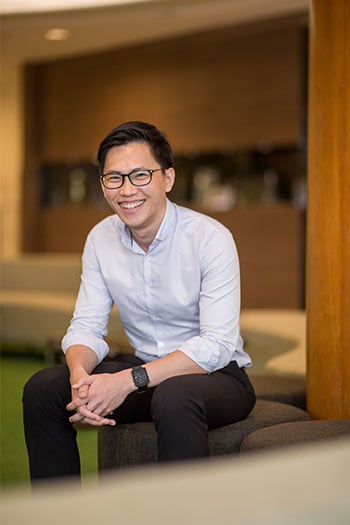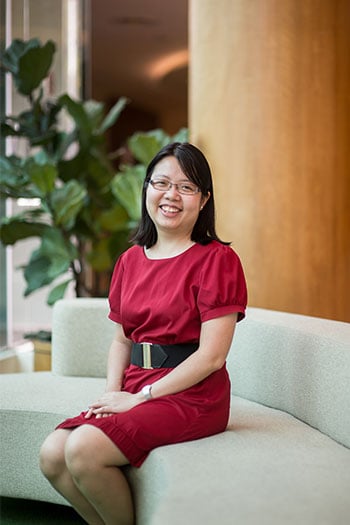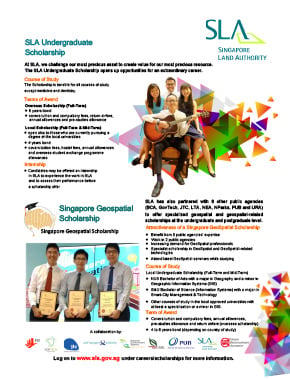Land optimisation is the core of Singapore Land Authority’s mission. In an ever-changing landscape to optimise the nation’s use of limited space, Singapore is proof of SLA’s accomplishment in one of the world’s most effective land resource optimisation models.
It is with the same drive and vision that has expanded the boundaries and horizons for passionate and talented individuals who wish to be part of this vision. Ng Yong Xiang and Ong Eng Hui give us a grounding on their experiences with SLA, and how their scholarships have benefited them.
What motivated you to apply for a scholarship with SLA?
Yong Xiang: I was in my second year of studies in NUS when I contemplated a specialisation in Geospatial Information Systems (GIS). At that time, the Singapore Geospatial Scholarship (SGS) was just established, and what enticed me was the opportunity to join the Government in establishing the field of geospatial information and technology – one of the key enablers for enhanced public service delivery. I found mastery in GIS an invaluable skill that would open the door to many exciting opportunities, and ultimately, the positive prospects in the geospatial field convinced me that the domain and SGS would be a good fit.
Eng Hui: I have always been fascinated by Singapore’s evolving urban landscape, and how a small country like Singapore has constantly found ways to overcome its land constraints to meet its developmental needs. Thus, the prospect of working with an organisation that focuses strongly on the optimisation of land use attracted me to apply for a scholarship with SLA.

Ng Yong Xiang
Singapore GeoSpatial Local Undergraduate Scholar
Seconded to National Environment
Agency as Senior Executive (Systems Integration)
Share with us the other opportunities you have received under your respective scholarships.
Yong Xiang: One of the perks of the SGS scholarship is the opportunity to work in two agencies with very different geospatial agendas and requirements. At SLA, I was exposed to a ‘Whole-of-Government’ perspective and contributed to our local and international geospatial engagements. Now at NEA, I take on more technical challenges, help develop in-house geospatial capabilities, and drive the adoption of attendant technologies to spark operational efficiency in the agency.
Eng Hui: I was given opportunities out of my current work scope, including my role as Assistant Board Secretariat, which provided a macro perspective of the issues and strategic concerns faced by SLA at the organisational level. I was also fortunate to participate in a United Nations geospatial conference, an eye-opening experience which allowed me to witness geospatial issues on an international platform. These opportunities broadened my horizons and provided deeper insights into areas outside my daily work.
Elaborate more on your main roles and responsibilities. How do they contribute to the organisation’s objectives?
Yong Xiang: At SLA, I worked on Geospatial policy and planning initiatives, where I actively collaborated with agencies across a diverse range of initiatives, such as ‘Whole-of-Government’ geospatial platform development, data sharing and management, and strategic planning. I had the chance to work with the private sector and public to raise GIS awareness and foster collaborations. These efforts worked towards realising SLA’s GIS leadership role across the government.
At NEA, I manage the agency’s GIS enterprise system which fosters integration of location-based services into various application systems, and promotes greater adoption of geospatial information and analytics across the departments. By equipping our officers with relevant geospatial skills and tools to address challenges and create opportunities, NEA’s mission to safeguard, nurture and cherish Singapore’s environment is realised.
Eng Hui: I am currently seconded to the Land Policy Division in the Ministry of Law, where our main role is to formulate and review land policies to meet the objective of optimising land resources in support of Singapore’s economic and social growth. My portfolio deals with issues on land sales, lease administration and renewals. During our work, we often must weigh the needs of different stakeholders and balance policy trade-offs. For instance, one consideration of the lease renewal policy is to strike a balance between the need for urban rejuvenation and the need for conservation or preservation of community.
What do you find fulfilling about your role?
Yong Xiang: I see my role as one of an enabler which affects decision-making and enhance service delivery. It gives me a sense of purpose when I can utilise my expertise to shape positive outcomes for policy or technical challenges that come along.

Ong Eng Hui
SLA Local Undergraduate Scholar
Seconded to Ministry of Law as Assistant Director
(Land Policy)
Eng Hui: An interesting aspect of land-related work is that you often pass by sites which you might have dealt with at work, when you move around different parts of Singapore. It is a tangible reminder of how land policy and administration play a part in shaping the urban landscapes and lives of fellow Singaporeans. I derive satisfaction in knowing that my work in the public service makes a difference in one way or another, however small my contribution may be.
What advice would you like to share with those exploring their scholarship options?
Yong Xiang: Aspiring scholars should assess where their interests lie and seek opportunities to acquire knowledge, and appreciate the working experiences of those who are in their fields of interest. These considerations will provide clarity in their scholarship selection and match them to an organisation that best aligns with their interests.
Eng Hui: Consider your strengths and weaknesses, and where your interests lie. Keep an open mind, identify as many options as you can, and carry out a thorough research. Before deciding, talk to people, and if possible, intern at the organisation to understand its culture and what the job entails. You should identify an organization that can develop your potential and leverage on your strengths, which in turn leads to meaningful contributions.

